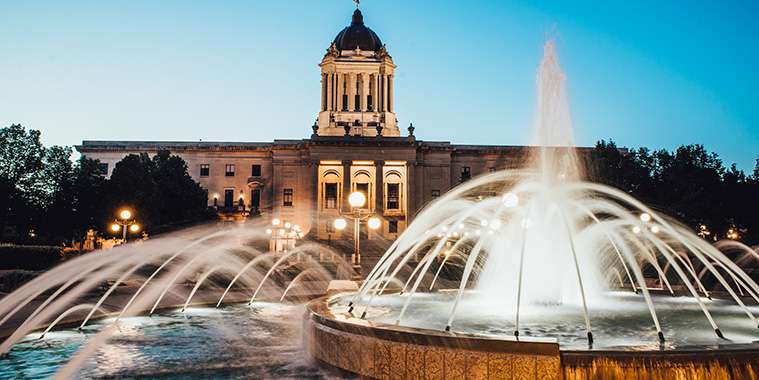By Peter Squire
March has been a very eventful month, from the government of Manitoba releasing its budget late due to a filibuster in the Legislature, to the disruptions caused by the Covid-19 virus. Yet despite its own disruptions from opposition to some of its initial proposals, the City of Winnipeg managed to pass its first multi-year budget for 2020-23.
One of the proposals that WinnipegREALTORS® questioned was the Standing Policy Committee on Water and Waste recommending that multi-family properties — which includes condominiums — no longer receive garbage pick-up. This policy was particularly unpopular as it made no sense to
eliminate a core civic service to condominium owners who pay the same portion of their property
taxes as single-family home owners. A concerted campaign by the Canadian Condominium Institute for condominium owners, that expressed to their City Councillors and Mayor Brian Bowman how
unfair this proposal was, clearly made a difference as this proposal had been eliminated when the
preliminary budget was unveiled.
In his wrap-up remarks to approving the budget, Bowman acknowledged that multi-family garbage collection will continue.
“The preliminary multi-year balanced budgets do not include any of the proposed closures of existing City facilities or any other significant reductions to important City services, such as discontinuing multi-family garbage collection or changes to street lighting,” he said.
Bowman and Finance Chair Scott Gillingham listened to City Councillors, and Winnipeg property owners as a whole — many who are hard-pressed to pay their total property tax bill — by showing real discipline in keeping property tax increases for the next four years to 2.33 per cent.
Significant to the tax increase is the allocation of where it is going.
The annual property tax increase is dedicated entirely to funding road renewal and financing the Southwest Rapid Transitway. Over the next six years ($847 million from 2020 to 2025), this financial commitment works out to an average of $141 million per year — the largest investment in roads in Winnipeg’s history. It was also noted that there is significant capital investment in combined sewer overflows and two new firehalls — Waverley West and Windsor Park. And as outlined in the province of Manitoba’s 2020 budget, new funding of $21.8 million is earmarked to the City of Winnipeg’s North End Wastewater Treatment Plant as all three levels of government work towards shepherding this important multi-year project to completion.
This major investment in infrastructure exemplifies the long-term focus of Winnipeg’s first multi-year budget. As Bowman stated, “The multi-year budgets provide a blueprint for transformative change in the way that we deliver key services and invest in infrastructure.
“It also provides greater certainty and predictability for ratepayers and represents a fiscally disciplined approach to controlling expenses and driving efficiency so that the City can chart a course to greater fiscal and environmental sustainability,” he added.
In line with making the city greener through investing in environmental sustainability, a real winner in the multi-year budget was Winnipeg Transit. As one of the driving forces behind supporting
transit, Councillor Matt Allard talked about the “art of the possible”, and it certainly rang true with a low-income bus pass, children under 12 to ride free starting in 2021, removal of the Transit Plus limit of 500 metres, restoring the U-Pass, and $13 million to support a spine-and-feeder service for the southwest transitway set to open this spring.
Outstanding advocacy on the part of post-secondary students with some serendipity at the right time coming from Manitoba’s 2020 budget PST reduction to 6 per cent, enabled the City to realize significant savings and put them towards supporting continuation of a well-utilized and popular U-Pass program that keeps many cars off the road. Although in light of the current pandemic, Premier Brian Pallister has recently announced the planned PST cut to 6 per cent will be postponed.
The nearly 40 per cent increase over the next four years to the City’s urban forestry enhancement program follows along the green theme and is a significant commitment to preserving Winnipeg’s tree canopy, which remains one of the city’s defining characters and strengths.
In summarizing the highlights of this pivotal long-term financial plan, Gillingham made a few key points. He said the budget is balanced for the next four years, something that is important and timely given the challenging days ahead with the Covid-19 pandemic affecting every aspect of daily life. He said civic departments need funding certainty with the uncertain times ahead of us, and that this multi-year balanced budget tackles tomorrow’s deficits by eliminating them today. The budget also creates financial capacity to respond to this crisis.
“This multi-year balanced budget process will also provide Council with the opportunity to make adjustments annually,” said Gillingham.
With so much fixation in this year’s budget process on fighting cuts to departmental budgets,
programs and community grants, there needs to be a heightened focus and effort to generate more revenue through growing the commercial assessment tax base. This could be achieved by providing service-ready employment lands, along with expediting development activity and business occupancies through digitizing permits.
Gillingham mentioned a new transformative fund which will be derived from selling or joint venturing the John Blumberg golf course, repurposing up to 30 per cent of City-owned golf lands, and reducing the number of owned and/or leased building assets including those leased to third parties.
“The long-term balanced budgets focus priority investments on core services that are important to the city’s mandate, and are at a level that is sustainable and predictable for residents,” said Bowman.
And after all of this considerable effort, robust departmental and operational reviews, and an open public process to get to the City’s first ever multi-year operating and capital budget, it is noteworthy that the first year of the operating portion of this four-year budget represents less than half of all property taxes collected in Winnipeg. Education property taxes still represent a higher percentage than municipal property taxes at 54.6 per cent in 2020.
However, the government of Manitoba’s plan to eliminate education taxes off property over the next 10 years will in all likelihood be pushed back from its original timeline, given the more pressing financial needs required to help Manitobans now and in the future with this current health and economic crisis.
March has been a challenge for everyone. It’s my hope that April finds you all healthy.
Peter Squire is WinnipegREALTORS® Vice-
President, External Relations & Market Intelligence.



